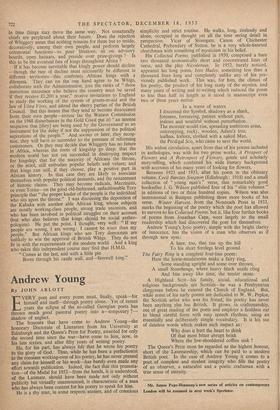Andrew Young
By JOHNARLOTT EVERY poet and every poem must, finally, speak—for himself and itself—through poetry alone.. Yet of recent years the eclipse of the so-called Georgian poets has thrown much good pastoral poetry into a—temporary ?- shadow of neglect. The honours that have come to Andrew Young--the honorary Doctorate of Literature from his University at Edinburgh and the Queen's Prize for Poetry, awarded for only the second time since the war—have come to him, now, in his late sixties, and after fifty years of writing poetry.
He, for his part, has always felt that he wrote his poetry to the glory of God. Thus, while he has been a perfectionist in the constant working-over of his-poetry, he has never pressed any claim for himself or his work—has barely even made any effort towards publication. Indeed, the fact that this presenta- tion—of the Medal for 1952—from the hands, it is understood, of the Laureate, should have been made not only without publicity but virtually unannounced, is characteristic of a man who has always been content for his poetry to speak for him. He is a shy man, in some respects austere, and of conscious simplicity and strict routine. He walks, long, tirelessly and alone, occupied in thought yet all the time seeing detail in perspective. Vicar of Stonegate, Canon of Chichester Cathedral, Prebendary of Sutton, he is a very whole-hearted churchman with something of mysticism in his belief.
His Collected Poems, published in 1950, comprised a bare two thousand economically short and concentrated lines of verse, and the play Nicodemus. In 1952, barely noticed, appeared his long poem, Into Hades, something less than a thousand lines long and completely unlike any of his pre- viously published work. This was, for him, the climax of his poetry, the product of his long study of the mystics, and many years of writing and re-writing which reduced the poem to less than half its length as it stood in manuscript even two or three years earlier.
In a waste of waters I discerned the Symbol, shadowy as a shark, foreseen, foreseeing, patient without pain, jealous and wrathful without perturbation. The monster would rise, spreading ambitious arms, outcropping, rocky, wooden, Adam's tree, leafless, forlorn, clothed with a naked Man, the Prodigal Son, who came to save the world.
His widest circulation, apart from that of his poems included in anthologies, was with his two prose works, A Prospect of Flowers and A Retrospect of Flowers, gentle and scholarly story-telling, which combined his wide literary background with accounts of his many years of looking for flowers. Between 1923 and 1933, after his poem in the obituary volume, Cecil Barclay Simpson (Edinburgh: 1918) and a small collection of " young man's " verse, that remarkably good bookseller J. G. Wilson published four of his " slim volumes " in editions of two or three hundred copies. Wilson was also instrumental in Bumpus publishing three more books of his verse. Winter Harvest, from the Nonesuch Press in 1933, marks the beginning of the poetry which the poet has allowed to survive to his Collected Poems, but it, like four further books of poems from Jonathan Cape, went largely to the small readership which had discovered the poet for themselves. Andrew Young's lyric poetry, simple with the bright clarity of innocence, has the vision of a man who observes as if through new eyes : A hare, too, that ran up the hill To his short forelegs level ground.
The Fairy Ring is a complete four-line poem: Here the horse-mushrooms make a fairy ring, Some standing upright and some over thrown, A small Stonehenge, where heavy black snails cling And bite away like time the tender stone.
A Highland Scot—his family, social, educational and religious backgrounds are Scottish—he was a Presbyterian clergyman before he entered the Church of England. But, while some of his early poems are dedicated to W. W. Peploe, the Scottish artist who was his friend; his poetry has never been anything else but British. It grows, in craftsmanship, out of great, reading of the poets and employs a faultless ear to blend careful form with easy -speech rhythms, using an essentially and deliberately simple vocabulary. It is his use of dateless words which makes such impact as: Why does it hurt the heart to think Of that most bitter abrupt brink Where the low-shouldered coffins sink ?
The Queen's Prize must be regarded as the highest honour, short of the Laureateship, which can be paid to a modern British poet. In the case of Andrew Young it comes to a poet of complete and modest integrity who fills the poetry of an observer, a naturalist and a poetic craftsman with a true sense of eternity. ,










































 Previous page
Previous page